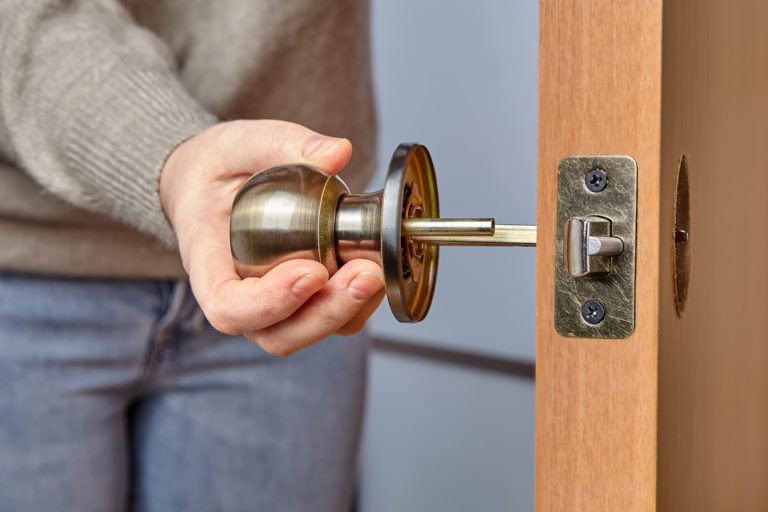Freezing temperatures can take a toll on your locks, leading to stiffness, freezing, or complete malfunction. This can result in frustrating situations and potential damage to your keys and locks. By taking preventative steps to weatherproof your locks, you can keep them functional and reliable throughout the winter months. Here’s a detailed guide to protecting your locks and ensuring they operate smoothly in the cold.
Why Locks Freeze and How to Prevent It
Moisture entering a lock can freeze in cold temperatures, causing the mechanism to become stiff and unresponsive. This often happens due to rain, snow, or condensation. Dirt and debris may further exacerbate the issue by clogging the internal components. Recognizing these causes is the first step in protecting your locks from freezing.
How to Select the Right Lubricant for Winter Locks
A quick and effective way to weatherproof your locks is by using the proper lubricant. High-quality options like graphite powder or silicone-based lubricants minimize friction, repel moisture, and prevent freezing. Avoid oil-based products such as WD-40, as they can become sticky in cold temperatures and attract debris.
Steps to Apply:
Insert the nozzle or straw into the lock’s keyhole.
Dispense a small amount of lubricant.
Use your key to turn the lock a few times, spreading the lubricant inside.
Remove any extra lubricant from the lock’s exterior.
Applying lubricant regularly, especially before winter sets in, helps keep locks working smoothly in cold weather.
Shield Your Locks from Rain, Snow, and Ice
To prevent frozen locks, it’s essential to block moisture from entering. Here’s how:
Install a Weatherproof Cover: Protect your locks from rain, snow, and ice by using lock covers or shields. These are readily available at hardware stores and reduce freezing risks.
Seal Gaps Around Locks: Inspect for gaps around locks or door frames, especially on exterior doors. Use weatherstripping or caulk to seal these gaps and prevent moisture intrusion.
Use a Lock De-icer Spray: For emergencies, keep a lock de-icer spray on hand to melt ice and clear moisture. Remember, this is a temporary fix and not a substitute for preventive measures.
Why Spare Keys Should Stay Indoors in Winter
Exposing spare keys to winter weather can lead to freezing and brittleness, making them harder to use. To prevent this, keep spare keys indoors in a dry, warm place. If an outdoor spare is essential, a weatherproof lockbox can provide the protection needed to withstand freezing temperatures.
How to Cover and Protect Outdoor Locks in Winter
Gates, sheds, and garage locks are particularly vulnerable to cold weather. Covering outdoor locks with a plastic bag, sock, or rubber cap, held in place with a rubber band, can shield them from freezing conditions. This simple measure helps keep locks protected from snow and ice exposure.
Why Clean Locks Are Essential in Cold Weather
Clogged locks can freeze more easily in winter, as dirt and debris worsen the effects of cold weather. Regular cleaning ensures locks remain functional. Follow these steps:
Insert a cotton swab or pipe cleaner into the keyhole to clean out dirt and dust.
Use compressed air to dislodge hidden particles.
Apply lubricant to keep the mechanism running smoothly.
Maintaining clean locks is essential for effective weatherproofing.
Safer Alternatives to Hot Water for Thawing Locks
Hot water is not a safe solution for frozen locks, as it can refreeze quickly and make the issue worse. Instead, opt for effective alternatives such as a lock de-icer, lubricant, or a hairdryer set to low heat to gently melt the ice and restore functionality.
Regular Lock Testing: A Key to Smooth Operation
During the cold season, make a habit of testing your locks regularly, even if you’ve taken preventive measures. Insert your key and check for smooth operation. Any sign of stiffness or difficulty should be resolved quickly to maintain the lock’s functionality.
Upgrading Worn Locks for Better Winter Protection
Freezing temperatures can easily affect old or damaged locks, causing them to malfunction. If your lock shows rust, sticks, or is difficult to turn, consider replacing it with a weather-resistant or all-weather lock. These models are specifically crafted to withstand cold and moisture.
Keep Outdoor Locks Functional with Insulated Covers
For outdoor locks on gates, sheds, or garages, a lock sock or insulated protector can help keep them functional in cold weather. These covers, made from weather-resistant materials, provide insulation from freezing temperatures and are a simple way to prevent frozen locks.
Why Deadbolt Covers Are Essential for Winter Lock Care
For deadbolt locks exposed to the elements, a deadbolt cover is a practical solution. It shields the lock from snow, wind, and ice, helping to prevent freezing. These covers are simple to install and can be found at most hardware stores, making them an effective choice for winter protection.
Why Every Home Needs a Lock De-icing Kit
Emergencies happen, even when precautions are in place. Prepare for frozen locks by assembling a de-icing kit for your home or car. Equip it with a lock de-icer spray, a small can of compressed air, and a lightweight hand warmer. This kit ensures you’re ready to resolve lock issues quickly and efficiently.
Why Digital Locks Are Perfect for Cold Weather Regions
For those living in areas with harsh winters, upgrading to digital or smart locks is a practical solution. These locks eliminate the need for traditional keys, reducing the chances of freezing or key breakage. Many smart locks also include weatherproof features, making them ideal for cold climates. Though they require a higher initial investment, they can save you from the frustration of frozen locks in the future.
How Scheduling Maintenance Keeps Locks in Good Condition
Locks require periodic maintenance to stay in top condition. At the beginning and end of winter, inspect each lock for rust, damage, or wear. Apply lubricant and clean them thoroughly, replacing any locks that show signs of significant deterioration. Consistent care ensures your locks stay functional no matter the season.
Preparing your locks for winter is an important part of home maintenance. By using the right lubricants, protecting against moisture, and keeping locks clean, you can avoid freezing issues and maintain reliable operation. If your lock does freeze, skip forceful methods or hot water and use de-icers or gentle heating to resolve the problem.
By taking time to maintain your locks and making weatherproof upgrades, you can keep them reliable through the toughest winters. Proper care extends their lifespan and offers the reassurance that your locks will perform when you need them most, no matter the conditions.

